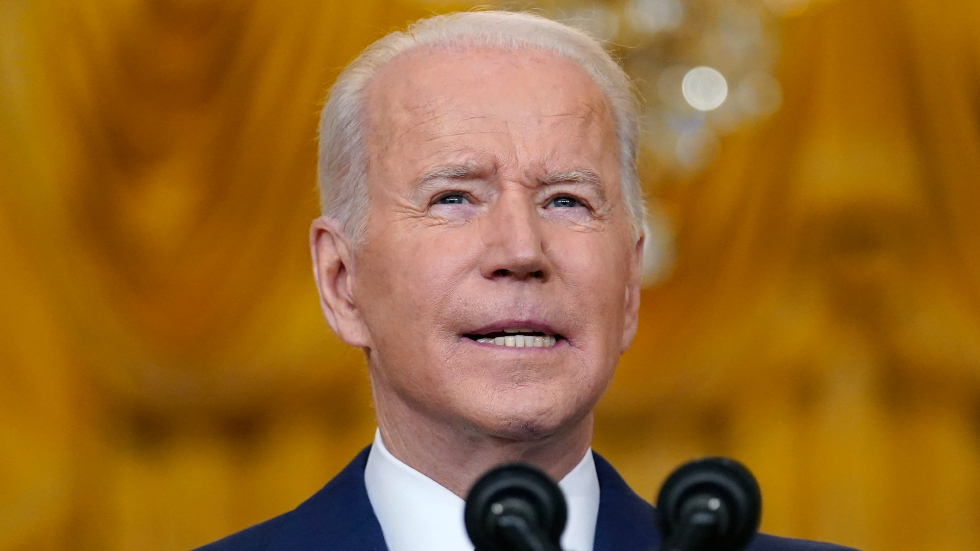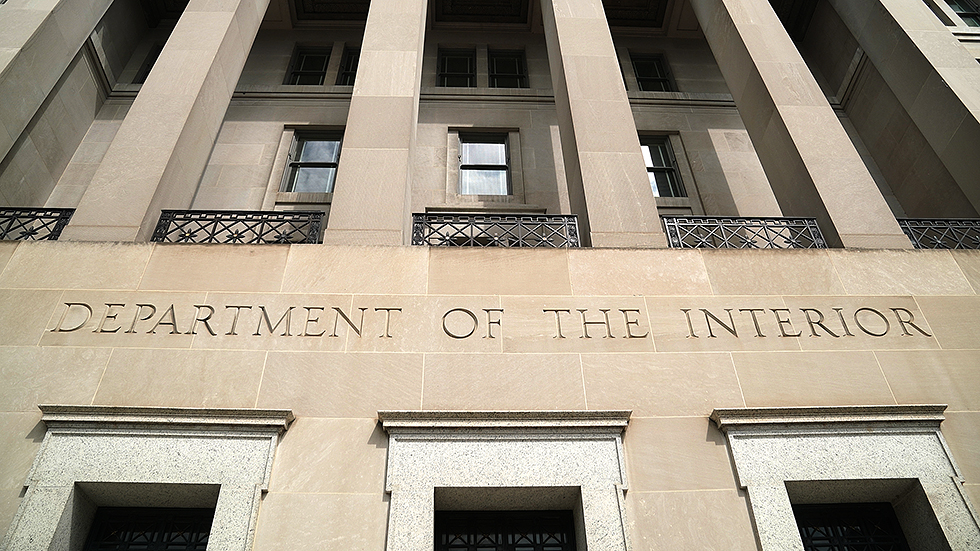Overnight Energy & Environment — Germany uses Nord Stream 2 to hit Russia

Welcome to Tuesday’s Overnight Energy & Environment, your source for the latest news focused on energy, the environment and beyond. Subscribe here: digital-stage.thehill.com/newsletter-signup.
Today we’re looking at Germany blocking the Nord Stream 2 pipeline as Russia enters Ukraine, the broad implications of blocking Biden’s accounting metric and a nod towards mining reform from the Biden administration.
For The Hill, we’re Rachel Frazin and Zack Budryk. Write to us with tips: rfrazin@digital-stage.thehill.com and zbudryk@digital-stage.thehill.com. Follow us on Twitter: @RachelFrazin and @BudrykZack.
Let’s jump in.
Blocked Nord Stream adds to Europe’s fuel price crunch

Germany’s decision to halt a major gas pipeline from Russia is throwing an additional wrench into Europe’s existing energy crunch.
The project, which is known as Nord Stream 2 and would ship natural gas from Russia to Germany, has been a point of contention with the U.S., which had previously waived sanctions on the project even as officials worried it would increase Europe’s dependence on Russia, which is already a major natural gas supplier for the continent.
Germany’s decision, part of a sharp response among Western powers to Russia’s incursion into Ukraine, represents a significant step by a U.S. ally in pushing back against Moscow.
So what did they have to say? “It is important to launch new sanctions now in order to prevent an escalation and a disaster,” German Chancellor Olaf Scholz said Tuesday in announcing a move to prevent the pipeline’s certification.
While the Nord Stream 2 pipeline was not yet in operation, experts described Germany’s decision as an additional hit to a region that has already struggled with high natural gas prices.
“European policymakers saw Nord Stream 2 as a vital tool in easing the pressure on consumers already facing record energy prices,” said Nicola De Blasio, a senior fellow in the Environment and Natural Resources Program at Harvard’s Belfer Center for Science and International Affairs, in an email.
Nevertheless, European officials have sought to reassure the public there will be enough natural gas to make it through winter.
“Even in case of full disruption of gas supply from Russia, we are on the safe side for this winter,” European Commission President Ursula von der Leyen recently told the Munich Security Conference.
Liana Fix, a resident fellow at the German Marshall Fund, said the extent to which this will impact energy depends on how Russia responds.
“What will have an effect is how Moscow reacts to that and whether Moscow uses energy sanctions against Europe,” Fix said.
And there’s always politics. Germany’s decision didn’t just have implications for energy policy.
Fix pointed out that the move represented strong and immediate pushback on Russia from Germany.
“This was a very clear sign very early at the beginning of the conflict, and it also demonstrated that Germany expects the escalation to become worse,” Fix said.
Read more about the situation here.
Climate ruling hamstrings various agency actions

Dozens of federal actions dealing with everything from energy efficiency standards to funding for transit projects have been upended by a recent court ruling against the Biden administration’s climate change calculations.
The administration said in a court filing this weekend that nearly 40 agency rules will have to be postponed or reworked after a federal court restricted its ability to measure their climate impacts.
Earlier this month, Judge James Cain, a Trump appointee in Louisiana, preliminarily blocked the administration from using the “social cost of greenhouse gas” values it had instated to help quantify the climate benefits or consequences of federal actions.
Some background info: The White House last year temporarily returned to Obama-era figures for calculating the costs of the planet-warming gases, which gave much greater value to climate damages than those used under the Trump administration.
For the past several months, these figures had provided a uniform measure by which the federal government has accounted for the climate impacts of its actions.
Now the government is asking for Cain’s ruling to be temporarily blocked while its appeal against it proceeds.
“The consequences of the injunction are dramatic,” it said in a Saturday night filing.
“Pending rulemakings in separate agencies throughout the government — none of which were actually challenged here — will now be delayed. Other agency actions may now be abandoned due to an inability to redo related environmental analyses in time to meet mandatory deadlines,” it said.
In a court declaration, Dominic Mancini, who leads the White House’s Office of Information and Regulatory Affairs, noted that dozens of actions at the departments of Energy, Transportation and the Interior, as well as the Environmental Protection Agency (EPA) will be “postponed or reworked.”
By the numbers: Specifically, he said that the Energy Department has identified about 21 impacted rules, the Transportation Department has identified nine, the EPA has identified five and the Interior Department has identified three.
He also noted that the Transportation Department has identified about 60 environmental reviews that will be affected, while the Interior Department has found 27.
The filing listed a rule that the Interior Department is working on aimed at limiting excess climate-warming methane released during oil and gas drilling on public lands. It notes that in 2020, a court tossed a Trump-era rule that weakened restrictions on methane.
And it argued that the new ruling gives the government a conflicting set of instructions, since the new ruling barred it from considering international implications, while a prior ruling faulted the Trump administration for failing to do so.
And Mancini’s declaration said that the ruling similarly hamstrings the Energy Department’s ability to abide by a court-ordered deadline to issue new energy conservation standards for a certain type of housing.
Meanwhile, the government also noted in court that the ruling’s effects go beyond rulemaking, including impacting grant programs, such as one that provides money for transit projects through the Federal Transit Administration.
It said that the agency uses the climate cost estimates to figure out changes in emissions, which is one of several criteria for the grant program.
Because now it can’t do so, the Biden administration said the court “has effectively frozen the advancement of multimillion-dollar transit projects … while the agency figures out a plausible, and perhaps lengthy, alternative path forward.”
Read about what other impacts the social costs injunction is having here.
HOW DO YOU LIKE THEM DAPLS?
The Supreme Court on Tuesday rejected a push from the Dakota Access Pipeline to take up a lower court’s decision that vacated a permit for the vessel.
D.C. District Court Judge James Boasberg had struck down permits for the pipeline in 2020, saying that it needed a more rigorous environmental review, known as an Environmental Impacts Statement.
The company behind the pipeline, Dakota Access LLC, asked the high court in September to review that decision.
The company noted that tribes and environmental groups who have challenged it argue that without permits, the pipeline is currently operating unlawfully, and that this creates “a substantial risk of a shutdown.”
Dakota Access argued that the court should restore its permit to “ensure its continued operation and avoid the economic and environmental fallout of a shutdown.”
The Supreme Court did not explain its reasoning for denying the pipeline’s appeal. However, it noted that Justices Samuel Alito and Brett Kavanaugh didn’t participate in the consideration.
When he struck down the pipeline’s permits, Boasberg initially also halted the pipeline’s operations while it underwent further environmental review.
A higher court reversed that decision, ultimately leaving it up to the Biden administration, which declined to shut down the vessel. The Biden administration’s actions left the pipeline in operation amid the additional review.
Read more about the decision here.
Interior eyes mining reforms

The Interior Department is eyeing mining reforms, launching an interagency working group to deal with the issue on Tuesday.
It said in a press release that the group would “make recommendations for improvements necessary to ensure that new production meets strong environmental and community and Tribal engagement standards…while improving the efficiency and outcomes of the permitting process.”
While the conclusions that the group will ultimately reach are unclear, the department’s press release highlighted what many critics describe as lax rules governing mining currently.
It noted that mining companies can stake claims “regardless of potential conflicts with other uses” and don’t have to pay royalties to the government for the minerals they extract when mining for gold, silver, copper, uranium, lithium, and nearly all critical minerals.
And the department said that the group will “inform potential rulemaking efforts on mining.”
It will also deliver recommendations to Congress by November, according to a White House fact sheet.
Meanwhile, the Interior Department also updated its list of critical minerals, notably excluding uranium, which had been on a 2018 list put forward by the Trump administration. It said that uranium, which is used in nuclear power, wouldn’t be included because it is a “fuel mineral,” which was barred by a recent law from inclusion.
That move met GOP pushback, with Sen. John Barrasso (R-Wyo.) arguing that this increases dependence on other countries.
“The day after Russia invaded Ukraine, President Biden has released a critical minerals list that makes the United States more vulnerable to Russia and our adversaries,” the lawmaker said in a statement.
The news comes as the administration also announced private sector actions that it said will bolster the critical minerals supply chain.
Read more about the overall push here.
WHAT WE’RE READING
- Interior: These 3,300 names would be better than existing slur (E&E News)
-
The group that brought down Keystone XL faces agonies of its own (Politico)
-
Researchers Say Science Skewed by Racism is Increasing the Threat of Global Warming to People of Color (Inside Climate News)
-
75% of people want single-use plastics banned, global survey finds (Reuters)
-
Who’s in charge of fixing the environment in eastern Oklahoma? (Grist)
ICYMI
Germany moves to halt Russia gas pipeline over Ukraine crisis
Qatari official says it will be ‘almost impossible‘ to quickly replace Russian exports to Europe
And finally, something offbeat and off-beat: Call the hops
That’s it for today, thanks for reading. Check out The Hill’s energy & environment page for the latest news and coverage. We’ll see you Wednesday.
Copyright 2023 Nexstar Media Inc. All rights reserved. This material may not be published, broadcast, rewritten, or redistributed. Regular the hill posts







